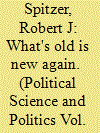|
|
|
Sort Order |
|
|
|
Items / Page
|
|
|
|
|
|
|
| Srl | Item |
| 1 |
ID:
105197


|
|
|
|
|
| Publication |
2010.
|
| Summary/Abstract |
Partisanship is strongly correlated with attitudes and behavior, but it is unclear from this pattern whether partisan identity has a causal effect on political behavior and attitudes. We report the results of a field experiment that investigates the causal effect of party identification. Prior to the February 2008 Connecticut presidential primary, researchers sent a mailing to a random sample of unaffiliated registered voters who, in a pretreatment survey, leaned toward a political party. The mailing informed the subjects that only voters registered with a party were able to participate in the upcoming presidential primary. Subjects were surveyed again in June 2008. Comparing posttreatment survey responses to subjects' baseline survey responses, we find that those reminded of the need to register with a party were more likely to identify with a party and showed stronger partisanship. Further, we find that the treatment group also demonstrated greater concordance than the control group between their pretreatment latent partisanship and their posttreatment reported voting behavior and intentions and evaluations of partisan figures. Thus, our treatment, which appears to have caused a strengthening of partisan identity, also appears to have caused a shift in subjects' candidate preferences and evaluations of salient political figures. This finding is consistent with the claim that partisanship is an active force changing how citizens behave in and perceive the political world.
|
|
|
|
|
|
|
|
|
|
|
|
|
|
|
|
| 2 |
ID:
121978


|
|
|
|
|
| Publication |
2013.
|
| Summary/Abstract |
This paper discusses the rise of the East India Company in the contested political world of eighteenth century India, with reference to the manner in which economic power was deployed to enhance military power. It is shown that there was only one successful model of military-fiscal strategy during this time, and that the Company's success was due to interactions between three factors-taxable resources, the strategies of its rivals, and institutional choices.
|
|
|
|
|
|
|
|
|
|
|
|
|
|
|
|
| 3 |
ID:
126330


|
|
|
|
|
| Publication |
2013.
|
| Summary/Abstract |
Political science and law intersect not only in the political world, but as disciplines. This is as it should be, and for two important reasons: disciplinary history and content. As Fisher (2009, 798) notes, the first political science graduate program, founded in 1880, studied "history, law, and philosophy." The American Political Science Association, founded in 1903, defined itself in terms of six distinct areas of study, five of which-comparative legislation, international law, constitutional law, administrative law, and jurisprudence-were in some manner about law (798). In addition, law is the expression of authority by the state. Its formation, content, and consequences form the purest expression of governmental power through what we more comprehensively define today as public policy. Early in the history of our discipline, political scientists approached the law in a manner that was "legalistic, formalistic, conceptually barren and largely devoid of what would today be called empirical data" (Somit and Tannenhaus 1967, 69). That is, they approached it as did lawyers of the time. Yet as political science matured, those who studied public law ceased being merely "little lawyers," vesting their work with no less respect for the content of law, but tempered also with the tools and perspectives of what was by now a distinct discipline. No early political scientist better exemplified this maturation than Edward Corwin, especially (although not exclusively) as reflected in his timeless study, The President: Office and Powers (1957).
|
|
|
|
|
|
|
|
|
|
|
|
|
|
|
|
|
|
|
|
|